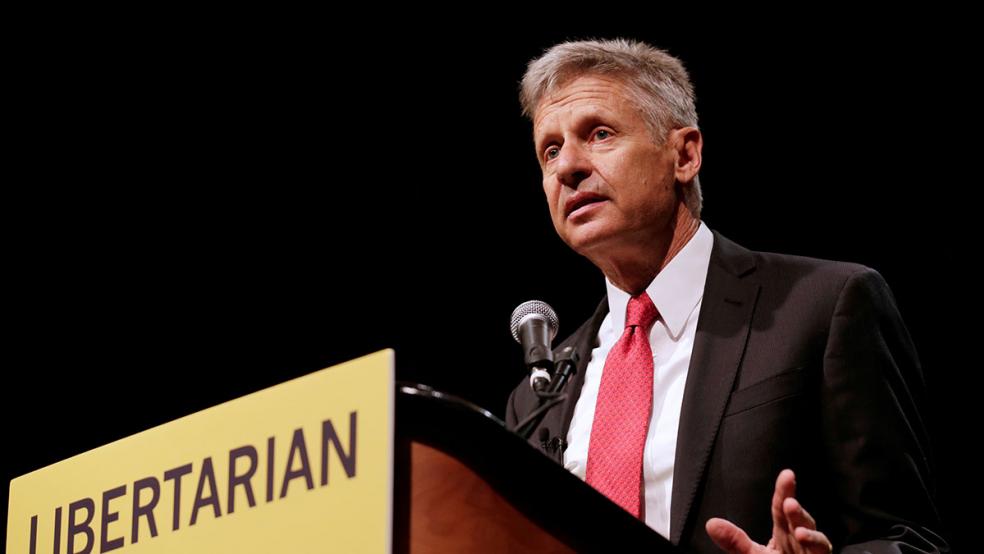With both Hillary Clinton and Donald Trump generating historically high negative approval ratings in polls, many voters will be looking at third party alternatives this year. But most will categorically reject minor party candidates, dismissing a vote for anyone other than Clinton or Trump as a wasted ballot. Such thinking is deeply flawed and very dangerous for America’s future.
The belief that voting for a candidate destined to lose is a waste confuses voting with betting. Unlike the lottery, there is no immediate reward for picking the winning candidate. And, by voting for the “lesser of two evils,” each voter marginally helps a bad candidate take office.
The key word here is marginally. An individual vote almost never decides an election at the state or federal level. Even in very close elections, the margin of victory is much more than one vote. Sure, those individual votes, in aggregate, can swing an election, as they did in the 2000 presidential vote in Florida. But most voters — at the very least, those in reliably blue states like California or reliably red states like Texas — should feel free to simply select the best candidate.
Related: The Libertarian Johnson-Weld Ticket Is Bad News for Donald Trump
In cases like California and Texas, where the results are often lopsided, the wasted vote logic could be applied to major party candidates. Should Californians planning to vote Republican or Texans planning to vote Democratic skip the election or vote differently simply because their vote “won’t count”? If a vote for a major party candidate destined to lose isn’t “wasted,” the same must be true of a vote for a minor party candidate also destined to lose.
Rather than a form of betting, voting is best understood as a statement of preference. The totals send signals to elected officials and future candidates about public attitudes. And this is why voting for a third party candidate can be useful.
If a third party candidate receives a large number of votes, or enough votes to change the outcome of an election, political leaders receive a signal that the ideas advanced by the third candidate are worth considering. Over the long term, policies advocated by the major parties may be affected by third party election results.
Related: Trump Says He Doesn’t Need the GOP; Republicans Might Be Okay with That
Let’s look back, for example, at Ralph Nader’s result in 2000. Running on the Green Party ticket, Nader received 2.7 percent of the nationwide popular vote. This included 97,488 votes in Florida, far more than the 537 votes that separated Bush and Gore in that election. Yes, Nader has been vilified by Democrats for throwing the election to Bush, but his result could also be viewed as a harbinger of the progressivism that would become ascendant in the Democratic Party in subsequent elections.
In reaction to the Reagan revolution and the 1994 Republican House takeover, Democrats began running more to the center. Nader’s result showed that a demand existed for a more progressive politics abandoned during the Clinton era. In some sense, Nader’s mantle was picked up by Howard Dean in 2004, Barrack Obama in 2008 and Bernie Sanders (himself an independent) in 2016. These candidates responded to a more full-throated progressivism whose attraction was initially demonstrated by Nader.
For those who don’t think Hillary Clinton is sufficiently progressive, the Green Party will offer Dr. Jill Stein as an alternative in November. Stein received 469,501 votes when she last ran in 2012. If she builds on that total in 2016, she will reinforce the message of Bernie Sanders’ primary campaign: that the Democratic Party should move further left.
Related: Can’t Vote for Trump or Clinton? Here Are Some Third Party Options
The Libertarian Party ticket, composed of two former Republican governors, could have a profound impact on the GOP if it does well this year. Since the late 1970s, Republicans have relied on an uneasy coalition of free market proponents, social conservatives and national security advocates. The rise of Donald Trump showed that the Republican base can no longer be relied upon to elect nominees who satisfy these three factions. Trump’s protectionist and anti-immigration rhetoric is unattractive to free marketeers. His socially conservative views seem to have been recently adopted and not firmly held. And although Trump uses some militaristic rhetoric, national security conservatives are repelled by his criticism of the proactive foreign policy employed by the Bush/Cheney administration.
Whether or not Trump wins the general election, his victory in the primaries has laid bare the weakness of the existing Republican coalition. After November, some sort of ideological realignment seems likely. The Gary Johnson/William Weld ticket can affect that realignment. Their platform mixes a strong free market position with a rejection of both social conservatism and aggressive foreign policy. If they attract a multiple of the 1.276 million votes Johnson garnered in 2012, they could move the Republicans toward a more socially liberal, non-interventionist view. Alternatively, their results could elevate the Libertarian Party to the level at which it becomes a legitimate third force in American politics.
Strong showings by the Libertarians, Greens or other third parties in the 2016 election are very unlikely to prevent a Trump or Clinton presidency. But they could affect the positions presidential candidates take in 2020 and beyond. Just as many points in the Socialist Party platform became part of FDR’s New Deal, ideas from today’s third parties may be implemented by a future major party administration.
Related: A Trump-Induced Panic Is Setting In Among Longtime Conservatives
From this perspective, a third party vote is not a waste at all. Votes for the major party candidates, by contrast, reinforce the notion that their policies and personal attributes are good enough for the American public. Rather than accept these unappetizing choices, voters should demand better by voting third party.






